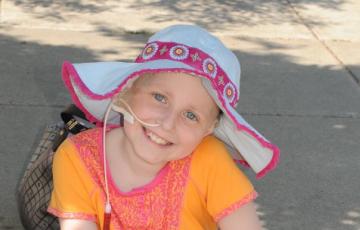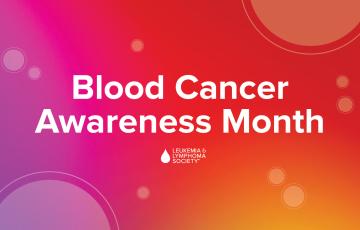Search Results
SAVE THE DATE AGAIN: GETTING MARRIED AFTER CANCER
My name’s Dustin. December 3, 2016 was the date that I was supposed to get married to KT. It was a Saturday. We had that date set for over a year, but there was no wedding—we canceled it the Tuesday before. KT informed most of our guests with an explanatory text: “So, I have some unfortunate news. We’re going to have to call off the wedding this weekend. Dust got cold feet…and leukemia.”
Busulfan
Busulfan is FDA approved in combination with cyclophosphamide as a conditioning regimen prior to allogeneic stem cell transplantation for people who have chronic myeloid leukemia.
Idelalisib
Idelalisib is FDA approved to treat patients with relapsed chronic lymphocytic leukemia (CLL), in combination with rituximab, in patients for whom rituximab alone would be considered appropriate therapy due to other co-morbidities.
Mercaptopurine
Mercaptopurine is FDA approved to treat people who have acute lymphoblastic leukemia as part of a combination regimen.
Asparaginase
Asparaginase is FDA approved in combination with chemotherapy to treat people who have acute lymphoblastic leukemia.
Quizartinib
Quizartinib is indicated in combination with standard cytarabine and anthracycline induction and cytarabine consolidation, and as maintenance monotherapy following consolidation chemotherapy, for the treatment of adult patients with newly diagnosed acute myeloid leukemia (AML) that is FLT3 internal tandem duplication (ITD)-positive as detected by an FDA-approved test.
Glasdegib
Glasdegib is indicated, in combination with low-dose cytarabine, for the treatment of newly-diagnosed acute myeloid leukemia (AML) in adult patients who are ≥75 years old or who have comorbidities that preclude use of intensive induction chemotherapy.
Limitation of Use: Glasdegib has not been studied in patients with the comorbidities of severe renal impairment or moderate-to-severe hepatic impairment.
Asparaginase erwinia chrysanthemi (recombinant)- rywn
Rylaze® is a component of a multi-agent chemotherapeutic regimen indicated for the treatment of acute lymphoblastic leukemia (ALL) and lymphoblastic lymphoma (LBL) in adult and pediatric patients 1 month or older who have developed hypersensitivity to E. coli-derived asparaginase.
Asciminib
Asciminib is indicated for the treatment of adult patients with:
- Newly diagnosed Philadelphia chromosome-positive chronic myeloid leukemia (Ph+ CML) in chronic phase (CP).
This indication is approved under accelerated approval based on major molecular response rate. Continued approval for this indication may be contingent upon verification of clinical benefit in a confirmatory trial(s). - Previously treated Ph+ CML in CP.
- Ph+ CML in CP with the T315I mutation.
A phase 1 study of CB-012, a CRISPR-edited allogeneic CAR-T targeting CLL1, in patients with acute myeloid leukemia
In February 2021, LLS made an equity investment in Caribou Biosciences to "Support allogeneic CD371 (CLL-1) CAR development for acute myeloid leukemia." Caribou is a clinical-stage biotechnology company, co-founded by CRISPR pioneer and Nobel Prize winner Jennifer Doudna, Ph.D., using next-generation CRISPR genome-editing technology to develop “off-the-shelf” (allogeneic) CAR therapies for hard-to-treat blood cancers.
FAQs: Proposed federal spending cuts and blood cancer research and care
The Leukemia & Lymphoma Society (LLS) has heard great concerns from patients, caregivers, volunteers, healthcare professionals, researchers, community organizations and others who are fearful and confused by NIH spending cuts and other policies being proposed and implemented in Washington.
Harnessing METTL3 inhibition in acute megakaryoblastic leukemia driven by the t(1;22) fusion involving a member of the m6A writer complex
I want to understand how the t(1;22) translocation that involves a member of the m6A writer complex drives acute megakaryoblastic leukemia (AMKL). To identify culprit genes and pathways I will use multi-omics, including RNA, eCLIP, and TimeLapse Seq and proteomics. I will dissect the RBM15-MKL specific effects of a novel METTL3 inhibitor in primary murine and human AMKL in vitro and in vivo. My ultimate goal is to cure this rare infant leukemia by harnessing METTL3 inhibition.
Healing Happens Around The Dinner Table
Too many parents lose their children to blood cancer each year. It’s a devastating experience for families blindsided by the harsh realities of cancer treatment that wasn’t developed with their little ones in mind. These lives lost too soon are the reason parents of children touched by blood cancer advocate fervently for change. And it’s a cause their communities and loved ones are more than happy to join—developing better treatment options that are safer and more effective for children, causing fewer side effects and leading to better outcomes.

Helping Survivors Lead Longer Better Lives
Late last year I had the privilege of attending a special screening of the documentary American Symphony. The film chronicles the experiences of writer Suleika Jaouad and her husband musician Jon Batiste after learning that her acute myeloid leukemia (AML) had returned after years of remission. The movie shows how the couple navigates uncertainty, treatment, and their new normal afterwards.
Chlorambucil
Chlorambucil is FDA approved to treat people who have chronic lymphocytic leukemia (CLL), some types of non-Hodgkin lymphoma and advanced Hodgkin lymphoma.
Idarubicin
Idarubicin is FDA approved in combination with other antileukemic drugs to treat people who have acute myeloid leukemia in adults.
Ifosfamide
Ifosfamide is an FDA-approved cancer therapy that is used to treat several types of cancer including acute lymphoblastic leukemia and non-Hodgkin lymphoma. It may cause temporary loss of hair in some people. After treatment has ended, normal hair growth should return.
Teniposide
Teniposide is FDA approved along with other medicines as induction therapy to treat people who have refractory childhood acute lymphoblastic leukemia, non-Hodgkin lymphoma and other types of cancer. This medicine often causes a temporary loss of hair. After treatment with teniposide has ended, normal hair growth should return.
Olutasidenib
Olutasidenib is indicated for the treatment of adult patients with relapsed or refractory acute myeloid leukemia (AML) with a susceptible IDH1 mutation as detected by an FDA-approved test.
